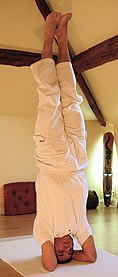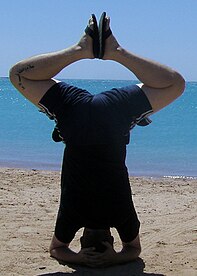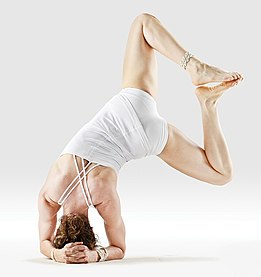Headstand: Difference between revisions
Appearance
Content deleted Content added
→Symmetrical yoga headstand: add text and thumb|Unkown Headstand 1 |
Tags: Mobile edit Mobile web edit |
||
| (32 intermediate revisions by 26 users not shown) | |||
| Line 1: | Line 1: | ||
[[File:Hand and headstand.JPG|thumb|Man doing a headstand in a park in [[Buenos Aires]] |
[[File:Hand and headstand.JPG|thumb|upright|Man doing a headstand in a park in [[Buenos Aires]]]] |
||
| ⚫ | |||
The '''headstand''', or sometimes '''head stand''', is a pose that is an inversion posture of standing head down. The technique is used in different settings such as [[yoga]], [[breakdancing]], [[acrobatics]] and beginner [[gymnastics]]. |
The '''headstand''', or sometimes '''head stand''', is a pose that is an inversion posture of standing head down. The technique is used in different settings such as [[yoga]], [[breakdancing]], [[acrobatics]] and beginner [[gymnastics]]. |
||
== How to practice headstand == |
|||
==Variations== |
|||
===Symmetrical yoga headstand=== |
|||
| ⚫ | |||
* Start from kneeling position on mat and put your forearms on the floor in front of you. |
|||
===Asymmetrical yoga headstands=== |
|||
* Weave your fingers together and lie on your head, making a stable “tripod” with your hands and head. |
|||
Some inversion postures in yoga do not keep the legs and torso completely vertical.[[File:Mr-yoga-sideways-bound-angle-headstand-1.jpg|thumb|Mr-yoga-sideways-bound-angle-headstand-1]] |
|||
* Pressure your hips and straighten your legs, under your toes, until your hips are vertically above your shoulders. |
|||
* Engage your core and peel your legs off the ground at the very start when moving them towards the ceiling. |
|||
* Keep the steady position between your hands or to your toes and don’t let your head go down, but rather keep a straight line from head to heels. |
|||
* Breathe for a few moments, then gradually add duration to your pose with your strength and comfort level growing. |
|||
* To exit the pose, lower the legs slowly back down with the support of your hands and then lower yourself to a kneeling position. |
|||
==Health risks== |
|||
* If the headstand is not done perfectly, the performer is likely to suffer [[head injury]] from standing on the head. |
|||
* if one is suffering from high [[blood pressure]]''',''' one should avoid headstand. |
|||
==In yoga== |
|||
| ⚫ | |||
<gallery mode=packed heights=185px> |
|||
| ⚫ | |||
File:Unknown Headstand 1.jpg|alt=Unknown Headstand 1|With feet as in [[Baddha Konasana]] |
|||
File:Mr-yoga-sideways-bound-angle-headstand-1.jpg|A variation |
|||
</gallery> |
|||
==See also== |
==See also== |
||
* [[Handstand]] |
|||
| ⚫ | |||
*[[Shirshasana]] |
|||
== References == |
|||
* [https://baliyttc.com/yoga-posture/headstand-sirsasana/ Bali Yoga Teacher Training center] |
|||
==External links== |
==External links== |
||
| ⚫ | |||
{{Commons category|Headstands}} |
|||
* [https://www.youtube.com/watch?v=MG_gP46E21Y A video of a head stand] |
* [https://www.youtube.com/watch?v=MG_gP46E21Y A video of a head stand] |
||
* [https://www.yogateachertraining-india.com/headstand-or-sirsasana-advantages-disadvantages-precautions Freeze and Headstand Tutorial] {{Webarchive|url=https://web.archive.org/web/20200811001816/https://www.yogateachertraining-india.com/headstand-or-sirsasana-advantages-disadvantages-precautions |date=2020-08-11 }} |
|||
* [http://www.flashmavi.com/breakdance_headstand_and_basic_freezes.shtml Freeze and Headstand Tutorial] |
|||
{{Strength training exercises}} |
{{Strength training exercises}} |
||
{{Authority control}} |
|||
[[Category: |
[[Category:Static elements (gymnastics)]] |
||
Latest revision as of 09:43, 10 July 2024

The headstand, or sometimes head stand, is a pose that is an inversion posture of standing head down. The technique is used in different settings such as yoga, breakdancing, acrobatics and beginner gymnastics.
How to practice headstand
[edit]- Start from kneeling position on mat and put your forearms on the floor in front of you.
- Weave your fingers together and lie on your head, making a stable “tripod” with your hands and head.
- Pressure your hips and straighten your legs, under your toes, until your hips are vertically above your shoulders.
- Engage your core and peel your legs off the ground at the very start when moving them towards the ceiling.
- Keep the steady position between your hands or to your toes and don’t let your head go down, but rather keep a straight line from head to heels.
- Breathe for a few moments, then gradually add duration to your pose with your strength and comfort level growing.
- To exit the pose, lower the legs slowly back down with the support of your hands and then lower yourself to a kneeling position.
Health risks
[edit]- If the headstand is not done perfectly, the performer is likely to suffer head injury from standing on the head.
- if one is suffering from high blood pressure, one should avoid headstand.
In yoga
[edit]The yoga headstand, Shirshasana, may be balanced and symmetrical from all perspectives, even though not always in a legs-vertical position. The asana has many variations, several of them asymmetrical.
-
Yoga headstand, Shirshasana
-
With feet as in Baddha Konasana
-
A variation
See also
[edit]References
[edit]External links
[edit]- A video of a head stand
- Freeze and Headstand Tutorial Archived 2020-08-11 at the Wayback Machine



